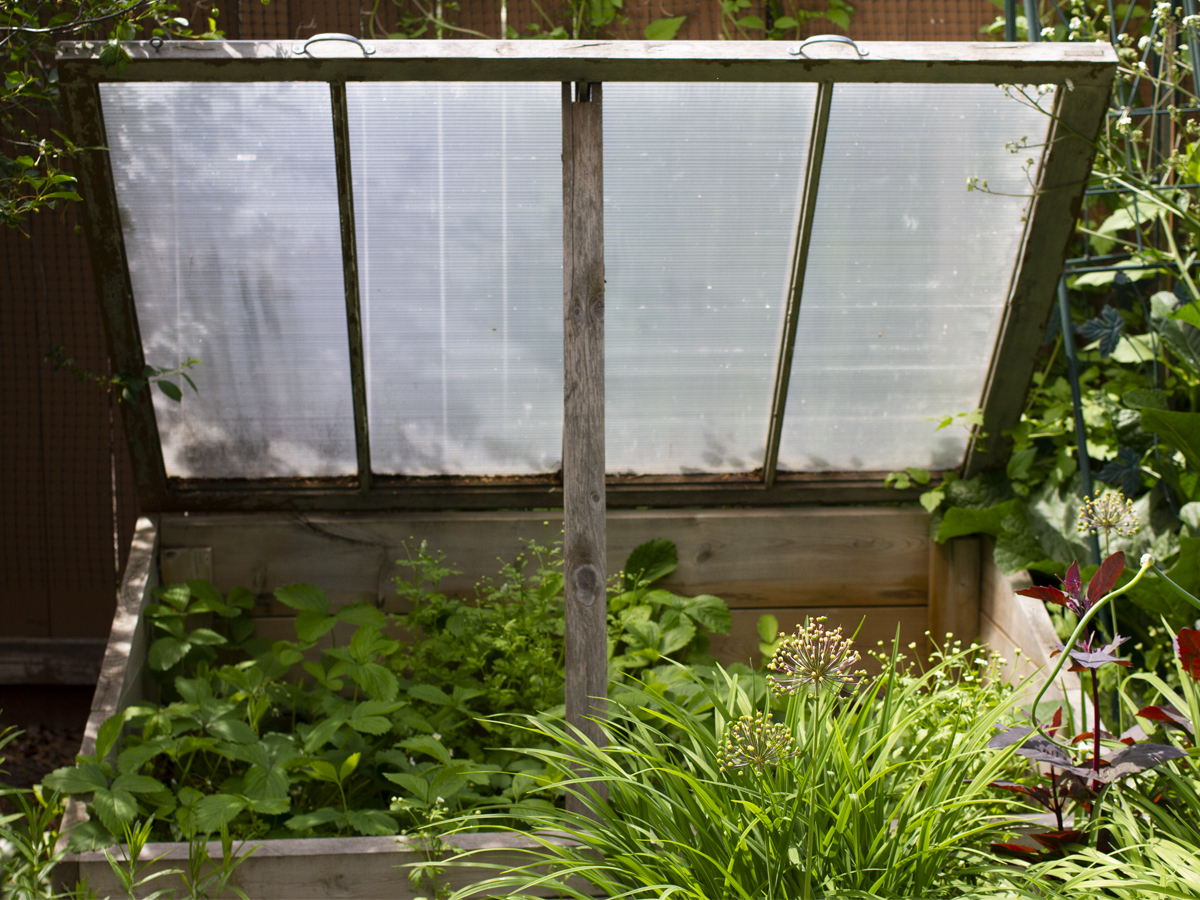It’s chilly out there!

Photo by Deborah Maier
April is a shoulder month for the gardening season. Some hardy seeds can be planted if the soil can be worked, but the ground in many places may still be frozen. So, what can an eager gardener do to get a jump on growing? Use a cold frame.
A cold frame is a structure designed to keep plants protected from cold outdoor temperatures. It has a translucent sloped lid to capture sunlight as its heat source. It can hold warmth overnight, keeping the inside temperature several degrees warmer than the outside temperature. This temperature difference can have a major impact to plants when the thermometer hovers around or dips below the freezing mark in the spring, which is common in April. How much heat it can hold depends on how it is built.
Typically, a cold frame is rectangular in shape. The back wall of the box is twice as high as the front and should be at least 40 cm high. The sloped top allows for efficient sun exposure. The ground under the cold frame needs to be well-drained to prevent water accumulation from snow melt or rain. Some cold frames sit on top of the existing soil surface, while others are placed in an excavation.
The sides can be made from many different materials: brick, cinderblock, framed plastic sheeting, polycarbonate, or wood. What is chosen often depends on the materials on-hand, or the desired insulating factor. Wood is commonly used as it is easy to work with to create sloped sidewalls, has insulating properties, and is durable. As most plants being placed in a cold frame are small, it does not have to be large.
Cold frames around 1 m x 2 m in size are common. The cold frame should be placed facing south to have the best sun exposure.
Some people like to grow directly in the cold frame and will fill it with 10 to 15 cm of potting mix, then plant seeds. More often, seedlings that were started indoors are moved to the cold frame for outdoor conditioning and improved sunlight exposure. If it is not used as a raised bed during the growing season, the cold frame can be stored until it is needed again.
My parents set up a large cold frame each April. They used old storm windows placed on a 2×4 frame positioned against the south-facing side of the house. The sides and front of the frame were covered in two layers of heavy plastic sheeting. One layer of plastic was stapled to the outside of the 2×4, the other to the inside.
The air gap between the plastic layers provided insulation. The house wall where the frame was positioned had a small basement window, which was occasionally opened to allow heat from the house to enter the cold frame. The storm windows were attached to the top of the frame with hinges, so they could be propped open on sunny days to allow excess heat to escape, and let air flow in.
The cold frame was made specifically for tomato plants. The plants were started in March on a table in the living room, placed next to the south-facing picture window. By April, the tomato plants would require transplanting and improved access to sunlight. Due to the risk of frost, these tender plants couldn’t be placed in the garden until June. A temporary protected location was needed. A cold frame was a simple, economical solution.
When the plants were first placed in the cold frame outside, they would be positioned close to the wall of the house, and the window to the basement would be opened. After a couple of nights, the window would be closed, and the plants spread out.
The window would only be opened again if the low was expected to be more than –5° C. When it was time to plant the tomato plants in the garden, they would be large, sturdy, and well acclimatize to the outdoor growing conditions.
Get a jump start on growing by adding a cold frame to your garden!
If you want to add some heat to your growing this season, join the Calgary Horticultural Society for the 2021 Garden Show—Virtual on April 24 and 25, presented by greengate Garden Centres. We’re bringing exciting speakers and a virtual tradeshow to our online event. Learn more about the Show and purchase tickets through our website, calhort.org
